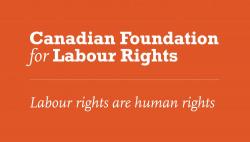This is an archive of news stories and research from the National Union of Public and General Employees. Please see our new site - https://nupge.ca - for the most current information.
The addition of three more laws passed in the last month brings the total number of regressive labour laws passed in Canada since 1982 to 204.
 Ottawa (12 July 2013) – Since the end of June, there have been three labour laws passed in Canada that restrict the collective bargaining rights of Canadian workers.
Ottawa (12 July 2013) – Since the end of June, there have been three labour laws passed in Canada that restrict the collective bargaining rights of Canadian workers.
Omnibus budget legislation allows the federal government to interfere in bargaining between Crown corporations and workers
The first was the federal government's 2013 omnibus budget legislation, Bill C-60, the Economic Action Plan 2013 Act, which received Royal Assent on June 26. A small section of the 128-page law allows the federal government to substantially interfere in the collective bargaining between federal Crown corporations and their employees.
There are currently 48 Crown corporations in Canada providing services to various sectors of the Canadian economy including transportation, energy, agriculture, fisheries, financial services and government services. They employ about 88,000 workers, most of whom are represented by unions. While these Crown Corporations are wholly owned by the government, they are distinct legal entities and operate, to a large extent, like private or independent enterprises.
While the federal government sets a mandate and an overall framework for collective bargaining by Crown corporations, Crown corporations have traditionally negotiated with their respective unions, without government interference.
Treasury Board must sign off on agreements
Bill C-60, however, contained a small section which gives the federal Cabinet the right to direct a Crown corporation to have its negotiating mandate approved by the Treasury Board. Crown corporations can only agree to a new a collective agreement that has been first approved by Treasury Board. The provisions also give the Treasury Board the power to directly set wages, working conditions and all other employment terms of non-union employees of Crown Corporations.
Legislation to end Quebec construction strike action
The second piece of restrictive labour law was passed in an 'extraordinary' Sunday sitting of the Quebec National Assembly on June 30 forcing an end to a two-week construction strike. Bill 54, An Act respecting the resumption of work in the construction industry, forced 77,000 construction employees and their employers to resume work by July 2nd or face fines from $100 for an individual offender to $125,000 for a union or an employers' association.
The legislation extended the current expired contract for one year and gave the workers the same annual pay increase of two per cent this year that was agreed to by the 98,000 construction workers who negotiated an end to their strike the week before. The legislation forbids strikes and lockouts during the period of the contract extension. Only Québec Solidaire, the left-leaning party with two Assembly seats, opposed a legislated end to the strike.
Right to strike removed by Nova Scotia's legislature for ambulance workers
Last Friday, July 5, the NDP government of Nova Scotia held a special one-day sitting of the provincial legislature to pass its first ever restrictive labour law to avert a pending strike by ambulance workers. Bill 86, the Ambulance Services Continuation Act, takes away the right to strike of ambulance workers during their current round of bargaining. The legislation forces the dispute to final selection offer arbitration. Both the union and the employer will now have to submit their final offers to a mutually agreed upon arbitrator who will choose one option within 90 days.
Three laws to restrict, suspend or eliminate collective bargaining rights in one month
These three pieces of legislation bring the total number of labour laws passed in Canada since 1982 that have restricted, suspended or eliminated collective bargaining rights of Canadian workers to 204.
For a full list and description of each of the 204 restrictive labour laws go to the Canadian Foundation for Labour Rights (CFLR) website.
CFLR is a national voice devoted to promoting labour rights as an important means to strengthening democracy, equality and economic justice here in Canada and internationally. CFLR was established and is sponsored by the National Union of Public and General Employees (NUPGE).
NUPGE
The National Union of Public and General Employees (NUPGE) is one of Canada's largest labour organizations with over 340,000 members. Our mission is to improve the lives of working families and to build a stronger Canada by ensuring our common wealth is used for the common good. NUPGE
